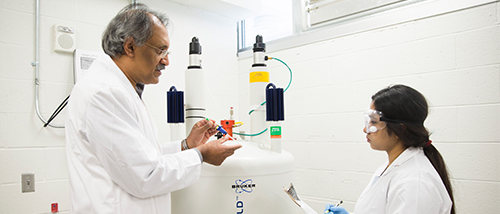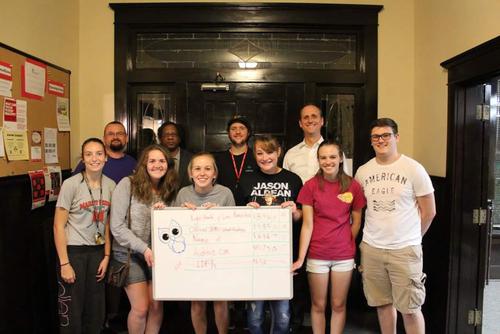Comprehensive Chemistry
Continue to main content
Comprehensive Chemistry Degree Map
Explore the courses you'll need to complete your degree.
Outcomes & Careers
-
$115k
Biochemist
According to the Bureau of Labor Statistics, the mean annual salary for a biochemist and biophysicist is $115,570.
-
$111k
Chemist & Materials Scientist
According to the Bureau of Labor Statistics, the mean annual salary for an elementary or middle school teacher is $111,410.
-
$95k
Chemist
According to the Bureau of Labor Statistics, the mean annual salary for a chemist is $95,940.
As a comprehensive chemistry major, you’ll gain a rigorous foundation in chemistry, science, and math in the context of a broad university education. You’ll complete a minimum of 120 credit hours to complete this degree, including the general education requirements and at least 39 senior division hours.
“Critical Courses” are italicized and bold. Data shows that students who have completed this course in the first two years and have earned the noted grade are most likely to complete this program of study.
Required Courses
- CH184 General Chemistry I Lab (1)
- CH185 General Chemistry I (3)
- CH186 General Chemistry II (3)
- CH187 General Chemistry II Lab (1)
- CH195 Chemistry Seminar I (1)
- CH271 Foundations of Analytical Chemistry (5)
- CH295 Chemistry Seminar 2 (2)
- CH306 Inorganic Chemistry (3)
- CH341 Found of Organic Chem (4)
- CH342 Organic Chemistry Lab I (1)
- CH360 Polymer Chemistry (1)
- CH495 Chemistry Seminar 3 (1)
- CH531 Found of Biochemistry (3)
Comprehensive Chemistry Option
- CH343 Advanced Organic Chemistry (3)
- CH Electives (300 level or higher): 3-4
Choose One of the Following Tracks:
American Chemical Society Certified Track
- CH311 Foundations of Physical Chemistry (4)
- CH312 Advanced Physical Chemistry (3)
- CH313 Physical Chemistry Laboratory (3)
- CH344 Organic Chemistry Laboratory II (2)
- CH391 Undergraduate Research (1)*
- CH532 Advanced Biochemistry (2)
- CH563 Advanced Inorganic Chemistry (5)
- CH575 Chemical Instrumentation (4)
Additional Requirements
- MA140 Analytic Geometry & Calculus I (5)
- MA145 Analytic Geometry & Calculus II (4)
- PH230 General Physics I (3)
- PH231 General Physics II (3)
Computational Chemistry Track
- CH412 Computational Chemistry (3)
- CS101 Introduction to Computer Programming (3)
- CS155 Computer Science I (4)
- CS265 Computer Science II (4)
- CS351 C & the POSIX Environment (4)
- CS503 Fundamentals of Computing (3)
- CSxxx 400-level elective (3)
Choose one course:
- CH311 Foundations of Physical Chemistry (4)
- CH312 Advanced Physical Chemistry (3)
Choose one course:
- CS433 Introduction to Data Analytics (3)
- CS445 Software Engineering I (3)
Additional Requirements
- MA 140 Analytic Geometry & Calculus I (5)
- MA 145 Analytic Geometry & Calculus II (4)
- PH 230 General Physics I (3)
- PH 231 General Physics II (3)
Choose one course:
- MA 345 Linear Algebra (3)
- MA 350 Differential Equations I (3)
Foundational Chemistry Track
- CH344 Organic Chemistry Laboratory II (2)
- Choose 9 hours of CH Electives (300-500 level) (9)
Choose one course:
- CH311 Foundations of Physical Chemistry (4)
- CH312 Advanced Physical Chemistry (3)
- CH575 Chemical Instrumentation (4)
Additional requirements:
Mathematics – 5-6 hours
Pick one:
- MA140 Analytic Geometry & Calculus I (5)
- MA139 Applied Calculus (3)
Pick one:
- MA223 Elementary Probability and Statistics (3)
- MA345 Linear Algebra (3)
- CS101 Introduction to Computer Programming (3)
Physics – 10 hours
Pick one option
- PH120 Introductory Physics I (5)
- PH121 Introductory Physics II (5)
OR
- PH230 General Physics I (3)
- PH231 General Physics II (3)
*Note: Completion of undergraduate research in the major is required. The departmental advisor should be consulted for information about this requirement.
Some requirements may be fulfilled by coursework in major program.
- Social and Behavioral Sciences – 6 hours
- Constitution Requirement – 3 hours
- Written Communication – 6 hours
- Oral Communication – 3 hours
- Natural Sciences – 7 hours (from two disciplines, one to include a lab)
- Mathematics – 3 hours
- Humanities & Fine Arts – 9 hours (from at least two disciplines)
- Additional requirements – 5 hours (to include UI100 for native students)
- Civics examination
First Year
Fall Semester (14-15 Hours)
- UI100 (1)
- EN 100 (3)
- CH184 (1)
- CH185 (3)
- CH195 (1)
- Required Math Course (3-5)
- General Education (3)
Spring Semester (13-14 Hours)
- CH186 (3)
- CH187 (1)
- Track Course (3-4)
- General Education (3)
- General Education (3)
Milestone: maintain 2.0 cumulative GPA
Second Year
Fall Semester (15 Hours)
- CH271/071 (5)
- CH341 (4)
- CH342 (1)
- Required Physics course (5)
Spring Semester (15-17 Hours)
- CH295 (2)
- CH343 (3)
- Required Physics course (5)
- Track Course (2-4)
- General Education (3)
Milestone: maintain 2.0 cumulative GPA
*Summer courses are encouraged to avoid 18 hour semesters
Third Year
Fall Semester (16-18 Hours)
- CH306 (3)
- CH360 (1)
- Track Course (3-4)
- Track Course (3-4)
- General Education (3)
- General Education (3)
Spring Semester (15-18 Hours)
- Track Course (3-4)
- Track Course (3-4)
- Track Course or Elective (3-4)
- General Education (3)
- General Education (3)
Milestone: maintain 2.0 cumulative GPA
Fourth Year
Fall Semester (15-18 Hours)
- CH531 (3)
- General Education (3)
- Track Course or Elective (3-4)
- Track Course or Elective (3-4)
- Track Course or Elective (3-4)
Spring Semester (13-17 Hours)
- CH495 (1)
- Chemistry Elective (3-4)
- Track Course or Elective (3-4)
- Track Course or Elective (3-4)
- Track Course or Elective (3-4)
Milestone: maintain 2.0 cumulative GPA
*A "Milestone" signifies a significant stage for a student in the completion of a degree.
A minimum 2.0 GPA in the major and overall are required to graduate with a BS degree.
Start a Seamless Pathway to Medical School
Southeast Missouri State University and the Lake Erie College of Osteopathic Medicine have partnered to provide SEMO students with a seamless transition to medical school. Are you exploring osteopathic medicine, pharmacy, dental medicine, or podiatric medicine? This pathway gets you on track for success.
What will it cost?
Become a Redhawk.
Do more than dream about the future. Take the first steps to make it all happen.
Class of 2021, Biochemistry, ACS Certified Chemistry, Forensic
"In May 2021, I graduated from SEMO with a Bachelor of Science in three majors: ACS Certified Chemistry, Biochemistry, and Forensic Chemistry; as well as a minor in Biology. With the knowledge and skills I have acquired during my undergrad, I received offers of admission into Ph.D. programs at multiple universities and medical centers. Those that interviewed me were impressed with the course work, research, and work experiences I have gained while at SEMO. Another great opportunity found at SEMO that was highly praised in my graduate school interviews was my work experience as a teaching assistant for multiple semesters. I have currently accepted admission to the University of Georgia to begin their Ph.D. program in fall 2021, and my experiences at SEMO have served as a stepping-stone in reaching my educational goals."
Sydney Bedillion

Department of Chemistry and Physics
One University Plaza, MS 6400
Cape Girardeau, MO 63701

